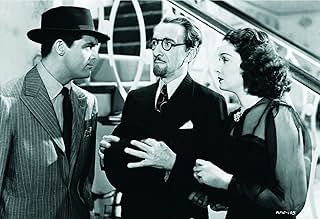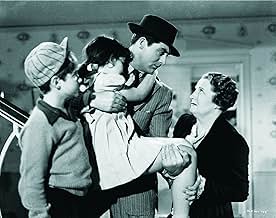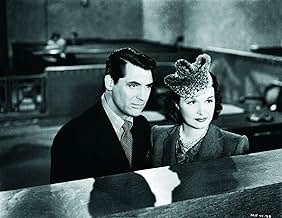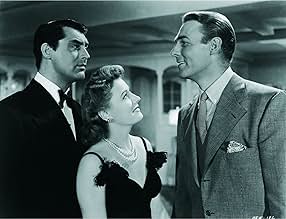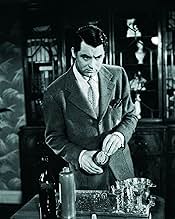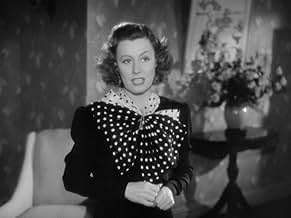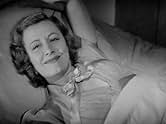CALIFICACIÓN DE IMDb
7.2/10
12 k
TU CALIFICACIÓN
Desaparecida durante siete años y presuntamente muerta, una mujer regresa a casa el día del segundo matrimonio de su marido.Desaparecida durante siete años y presuntamente muerta, una mujer regresa a casa el día del segundo matrimonio de su marido.Desaparecida durante siete años y presuntamente muerta, una mujer regresa a casa el día del segundo matrimonio de su marido.
- Dirección
- Guionistas
- Elenco
- Nominado a 3 premios Óscar
- 3 premios ganados y 3 nominaciones en total
Jean Acker
- Postponed Case Witness
- (sin créditos)
Murray Alper
- Yosemite Bartender
- (sin créditos)
Leon Belasco
- Waiter - Pacific Club Poolside
- (sin créditos)
Joe Cabrillas
- Phillip
- (sin créditos)
Bill Cartledge
- Page Boy Paging Burkett
- (sin créditos)
Chester Clute
- Shoe Salesman
- (sin créditos)
Corky
- Corky the Dog
- (sin créditos)
Opiniones destacadas
...albeit a little slow-paced in the first half. Leo McCarey's chaotic pace which made The Awful Truth so much fun is missed here, but Garson Kanin directs capably in his absence and the script and actors deliver enough good wit and chemistry to keep it all balanced out in the end.
Cary Grant gets himself into an unwitting romantic pickle when he's confronted by his thought to be long dead wife on his honeymoon with his new bride. Hilarity ensues, as it does in every brilliant screwball comedy Grant was the star of, and there are some priceless moments along the way.
As in The Awful Truth, Grant and Irene Dunne make a fetching and compatible screen couple. Dunne's comedic felinity and tendency to affect nutty stereotypes in order to get what she wants is better than Katharine Hepburn's imitation of her in Bringing Up Baby and The Philadelphia Story. Grant and Hepburn were terrific in their movies together too, and not taking anything away from Great Kate, but Grant and Dunne's chemistry was just that much better and it's a shame they never made more comedies together.
Hilarious in-jokey scenes between Grant and Randolph Scott, and a near scene stealing turn by Granville Bates as The Judge round out a pretty funny flick.
The Doris Day/James Garner remake "Move Over, Darling" is memorable in its own right and viewed right after this would make for a good video double-bill.
Cary Grant gets himself into an unwitting romantic pickle when he's confronted by his thought to be long dead wife on his honeymoon with his new bride. Hilarity ensues, as it does in every brilliant screwball comedy Grant was the star of, and there are some priceless moments along the way.
As in The Awful Truth, Grant and Irene Dunne make a fetching and compatible screen couple. Dunne's comedic felinity and tendency to affect nutty stereotypes in order to get what she wants is better than Katharine Hepburn's imitation of her in Bringing Up Baby and The Philadelphia Story. Grant and Hepburn were terrific in their movies together too, and not taking anything away from Great Kate, but Grant and Dunne's chemistry was just that much better and it's a shame they never made more comedies together.
Hilarious in-jokey scenes between Grant and Randolph Scott, and a near scene stealing turn by Granville Bates as The Judge round out a pretty funny flick.
The Doris Day/James Garner remake "Move Over, Darling" is memorable in its own right and viewed right after this would make for a good video double-bill.
I agree that Move Over Darling is a very good remake of My Favorite Wife, but Doris Day and James Garner, much as I like them, cannot reach the level of sophistication of Grant/Dunne. Randolph Scott does nothing to detract from the picture. Certainly no more than Chuck Connors does in the same role in Move Over Darling. The courtroom scenes with Grant and Granville Bates as the judge are superior, and Donald McBride as the hotel clerk is exceptional. Cary Grant's facial expression on the elevator when he first sees Dunne after 7 years is so memorable that I can still remember it 35 years after first seeing it. If you are a Grant fan, you have to see this movie.
After his shipwrecked wife is declared dead and he takes on a new wife, Grant's first wife resurfaces, rescued after seven years on an island. This reteaming of Grant and Dunne after their success with "The Awful Truth" is pretty funny for the most part, as Grant tries to solve the problem of one wife too many while dealing with jealousy after learning that Dunne had a male companion (Scott) on that island. The only complaint is that the laughs stop in the last quarter of the movie, which is rather uninteresting as the focus shifts from comedy to romance. Bates, who is hilarious as a flustered judge, died in July 1940 but managed to act in 12 films released that year!
A curious one that leaves a mildly bitter taste in the mouth. It's funny alright (but never hilarious), and the acting from - and chemistry between - Irene Dunne and Cary Crant is exquisite as always. But the film's fundamental problem is that none of the characters are particularly likable. Throughout the film three of the four main characters take their turn to behave despicably, yet the new wife - a woman who's merely unpleasant - is the villain of the piece; constantly the butt of jokes and fair game for ridicule even though she's done absolutely nothing to warrant it. At times it's like watching two spoilt brats from the Hamptons bullying their visiting second-cousin from the Bronx.
The script is also strangely stunted, best witnessed in the scenes before the judge. They really should have been classic screwball moments - the ingredients were there - yet between the lengthy silences and repetitive parrot-dialogue it falls almost completely flat. The gaping plot holes and poor script continuity can't be forgiven either, even allowing for the fact the film's seventy years old.
Don't get me wrong, I laughed, and I enjoyed myself, and I thought it was a decent film. It's just that the character's actions don't stand up too well under scrutiny.
The script is also strangely stunted, best witnessed in the scenes before the judge. They really should have been classic screwball moments - the ingredients were there - yet between the lengthy silences and repetitive parrot-dialogue it falls almost completely flat. The gaping plot holes and poor script continuity can't be forgiven either, even allowing for the fact the film's seventy years old.
Don't get me wrong, I laughed, and I enjoyed myself, and I thought it was a decent film. It's just that the character's actions don't stand up too well under scrutiny.
There are some lovely, touching and dryly amusing scenes in this film. Kanin and the scriptwriters manage to form a substantive, if occasionally gossamer light, whole out of the playing of fine leads and canny comic incidents. The basic story may be the oldest of chestnuts, but it is here embellished with some degree of incisiveness. Grant's scene by the pool with Dunne and Scott reaches a fine pitch of hilarity, and who can forget the impressionistic scene of Scott's diving coming into Grant's mind and being presented in miniature on-screen?
That master player of light, witty material, Grant, is of course sublime, and I was surprised by Irene Dunne - who I had never previously seen in a lead film role. She was magnificently feline, as Pauline Kael says; dispensing slinky, fluttering phrases and quips, and making it clear what a laugh the character is having; she seems rather to be getting off on the entangled situation. The speech patterns are drolly created by Dunne; wonderful Southern hamming, or archetypal screwball dame quick-talk... Her warming, gadding-about voice is charms, along with deft facial acting; look at the "Oh Bianca..." scene at the hotel early on, where she sensuously reclines on a settee and gets Grant to pretend he is entering the room and kissing his new wife. Minxish mischief of the most heartwarming kind, aye...!
Remarkable to think that Ms. Dunne was over forty when this was made. She has the bearing of many years younger and conveys an impressive vigour. One takes to her unconventional good looks; her slight awkwardness as a 'star' is amusingly alluded to, under the surface, in her son's dialogue late on; very poignant little moment, that. Like Rosalind Russell and Kate Hepburn, she is no textbook beauty, and it is her characterful playing conveys a winking, winning attractiveness. Why is it that we have so few similarly idiosyncratic actresses around today? All - or rather much - has to be homogenised; pop star product looks are apparently required, and conveyor-belted into mainstream films. Film is missing the enticing depths of real-life when it opts for the conformist teenage boy's supposed 'dream woman' - mass-media-fostered - over a greater variety of people and appearances, as one encounters in actual reality.
The actor playing the world-weary, rather Robb Wilton-esquire magistrate ought to have been involved more than he was; an enjoyable turn, that would have been effectively woven deeper into the narrative. Randolph Scott amused slightly too, in his support role; a worthy foil. Things did perhaps get rather sentimental with the involvement of the couple's children, although this is hardly the worst such offender in Hollywood history. The insidious wryness seems completely blunted by the end, when the couple are finally reconciled. One may be charmed by the actors' performances, but it all starts to seem a bit indulgent, and the feeling grows that chances were missed.
But really, one must be indulgent, critically; there is priceless stuff in this film's fibre, and while it fires not on all screwball-comedy cylinders, it is a very pleasant feature with glorious screen presences making (deceptively) light of life.
That master player of light, witty material, Grant, is of course sublime, and I was surprised by Irene Dunne - who I had never previously seen in a lead film role. She was magnificently feline, as Pauline Kael says; dispensing slinky, fluttering phrases and quips, and making it clear what a laugh the character is having; she seems rather to be getting off on the entangled situation. The speech patterns are drolly created by Dunne; wonderful Southern hamming, or archetypal screwball dame quick-talk... Her warming, gadding-about voice is charms, along with deft facial acting; look at the "Oh Bianca..." scene at the hotel early on, where she sensuously reclines on a settee and gets Grant to pretend he is entering the room and kissing his new wife. Minxish mischief of the most heartwarming kind, aye...!
Remarkable to think that Ms. Dunne was over forty when this was made. She has the bearing of many years younger and conveys an impressive vigour. One takes to her unconventional good looks; her slight awkwardness as a 'star' is amusingly alluded to, under the surface, in her son's dialogue late on; very poignant little moment, that. Like Rosalind Russell and Kate Hepburn, she is no textbook beauty, and it is her characterful playing conveys a winking, winning attractiveness. Why is it that we have so few similarly idiosyncratic actresses around today? All - or rather much - has to be homogenised; pop star product looks are apparently required, and conveyor-belted into mainstream films. Film is missing the enticing depths of real-life when it opts for the conformist teenage boy's supposed 'dream woman' - mass-media-fostered - over a greater variety of people and appearances, as one encounters in actual reality.
The actor playing the world-weary, rather Robb Wilton-esquire magistrate ought to have been involved more than he was; an enjoyable turn, that would have been effectively woven deeper into the narrative. Randolph Scott amused slightly too, in his support role; a worthy foil. Things did perhaps get rather sentimental with the involvement of the couple's children, although this is hardly the worst such offender in Hollywood history. The insidious wryness seems completely blunted by the end, when the couple are finally reconciled. One may be charmed by the actors' performances, but it all starts to seem a bit indulgent, and the feeling grows that chances were missed.
But really, one must be indulgent, critically; there is priceless stuff in this film's fibre, and while it fires not on all screwball-comedy cylinders, it is a very pleasant feature with glorious screen presences making (deceptively) light of life.
¿Sabías que…?
- TriviaCary Grant and Randolph Scott, who play rivals in this film, lived together on and off between 1932 and 1944.
- ErroresWhen Ellen has her first hot shower in seven years, she wears a bathing cap rather than washing her hair in the shower.
- Citas
Nick Arden: I came here with my wife... hum... my bride really. Now my wife, not my bride... my wife... Why should I bore you with details?
Hotel clerk: I won't be bored.
Nick Arden: Listen, it's just simple as A B C.
Hotel clerk: Don't tell me you got someone in B?
- Créditos curiososRather than the normal "The End" title as the movie concludes, "Good Night" is drawn in cursive handwriting.
- ConexionesEdited into Marilyn: Something's Got to Give (1990)
- Bandas sonorasJingle Bells
(1857) (uncredited)
Written by James Pierpont
Played as part of the score when Cary Grant dons his Santa Claus costume
Selecciones populares
Inicia sesión para calificar y agrega a la lista de videos para obtener recomendaciones personalizadas
- How long is My Favorite Wife?Con tecnología de Alexa
Detalles
- Fecha de lanzamiento
- País de origen
- Idioma
- También se conoce como
- My Favorite Wife
- Locaciones de filmación
- Productora
- Ver más créditos de la compañía en IMDbPro
- Tiempo de ejecución1 hora 28 minutos
- Color
- Relación de aspecto
- 1.37 : 1
Contribuir a esta página
Sugiere una edición o agrega el contenido que falta

Principales brechas de datos
By what name was Mi mujer favorita (1940) officially released in Canada in French?
Responda

